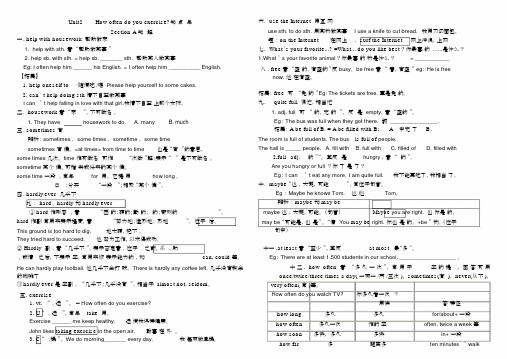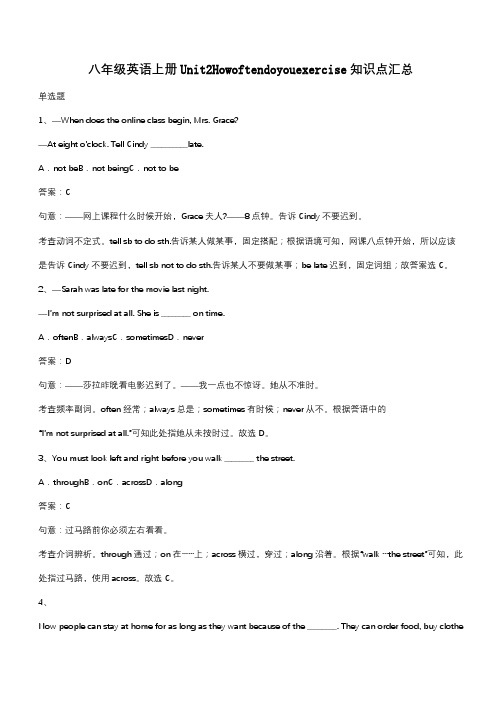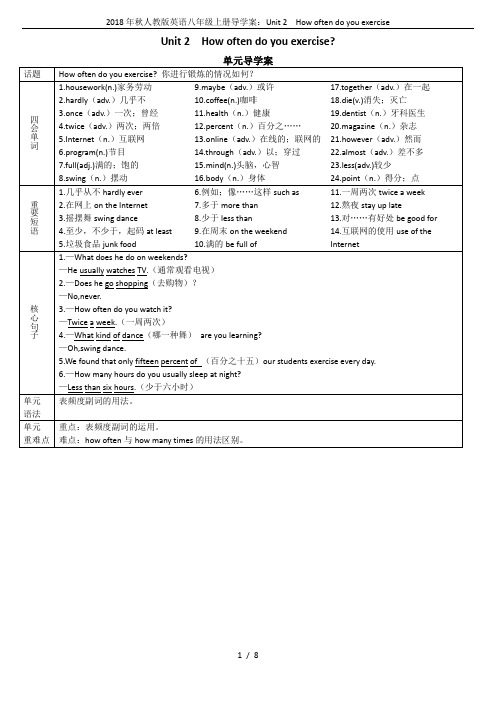2018秋八年级英语上册Unit2Howoftendoyouexercise第3课时导学案无答案新版
- 格式:doc
- 大小:105.00 KB
- 文档页数:3

Unit2 How often do you exercise?知点与Section A 知解一. help with housework 帮助做家1.help with sth. 意“帮助做某事”2.help sb. with sth. = help sb. _______ sth. 帮助某人做某事Eg: I often help him ______ his English. = I often help him __________ English.【拓展】1.help oneself to ⋯随便吃 /喝·Please help yourself to some cakes.2.can’ t help doing sth情不自禁做某事I can’ t help falling in love with that girl.我情不自禁上那个女孩。
二. housework 意“家”。
不可数名。
1. They have housework to do. A. many B. much三. sometimes 有辨析: sometimes , some times , sometime , some timesometimes 有候。
=at times= from time to time也是“有”的意思。
some times 几次。
time 作可数名可作“次数”解;表示“ ” 是不可数名。
sometime 某个候。
可指去或将来的某个候。
some time 一段。
常与for 用。
它提用how long 。
口:分开“一段”;相聚“某个候”。
四. hardly ever 几乎不比: hard、 hardly 和 hardly ever① hard 作形容,意“困的;硬的;勤的;的;苛刻的”。
hard 作副常用来表示程度,意“努力地;猛烈地;烈地”,位于后。
This ground is too hard to dig.地太硬,挖不。

八年级英语上册Unit2Howoftendoyouexercise知识点汇总单选题1、—When does the online class begin, Mrs. Grace?—At eight o'clock. Tell Cindy __________late.A.not beB.not beingC.not to be答案:C句意:——网上课程什么时候开始,Grace夫人?——8点钟。
告诉Cindy不要迟到。
考查动词不定式。
tell sb to do sth.告诉某人做某事,固定搭配;根据语境可知,网课八点钟开始,所以应该是告诉Cindy不要迟到,tell sb not to do sth.告诉某人不要做某事;be late迟到,固定词组;故答案选C。
2、—Sarah was late for the movie last night.—I’m not surprised at all. She is ________ on time.A.oftenB.alwaysC.sometimesD.never答案:D句意:——莎拉昨晚看电影迟到了。
——我一点也不惊讶。
她从不准时。
考查频率副词。
often经常;always总是;sometimes有时候;never从不。
根据答语中的“I’m not surprised at all.”可知此处指她从未按时过。
故选D。
3、You must look left and right before you walk ________ the street. A.throughB.onC.acrossD.along答案:C句意:过马路前你必须左右看看。
考查介词辨析。
through通过;on在……上;across横过,穿过;along沿着。
根据“walk…the street”可知,此处指过马路,使用across。
故选C。
4、Now people can stay at home for as long as they want because of the ________. They can order food, buy clothes, have classes, ect.A.worldB.InternetC.supermarketD.restaurant答案:B句意:现在因为有了互联网,人们想待在家里多久就待多久。

(名师选题)部编版八年级英语上册Unit2Howoftendoyouexercise易错知识点总结单选题1、Some people won’t realize the importance of their health they lose it. A.becauseB.afterC.whenD.until答案:D句意:有些人直到失去健康才意识到健康的重要性。
考查连词辨析题。
because因为,表原因;本句不表原因,可排除A。
after在……以后,表时间;when当……的时候,表时间。
until直到,主句动词通常只能是延续性动词,不能是终止性动词;但在否定句中,主句动词可以是终止性动词,此时构成not…until/till…句式,表示动作在 until/till从句表示的时间开始发生,意为“直到……才……”。
本句是否定结构,主句动词realize(意识)是非持续性动词,需用until引导时间状语从句;根据句意语境,可知选D。
2、If you want to be in good ________, you should eat ________ food.A.healthy; healthyB.health; healthC.healthy; healthD.health; healthy答案:D句意:如果你想保持健康,你应该吃健康的食物。
考查名词及形容词辨析。
短语be in good health“保持健康”;第一空health在这里是不可数名词;第二空是形容词作定语,修饰名词food,healthy是形容词,健康的。
故选D。
3、—Would you like some Coke?—No, thanks. I _________ drink Coke.A.neverB.alwaysC.oftenD.usually答案:A句意:——你要来些可乐吗?——不,谢谢。
我从不喝可乐。
考查频度副词辨析。
never从不;always总是;often经常;usually通常。

八年级英语上册Unit2Howoftendoyouexercise重难点归纳单选题1、Eating more vegetables ________ good ________ your health.A.are;toB.is;toC.is;forD.are;for答案:C句意:多吃蔬菜对你的健康有好处。
根据be good for对---有好处,排除A/B;根据主语Eating more vegetables 动词做主语,谓语动词用单数形式;故选C2、—Does the dish taste as ___________ as it looks?—Yes. I can't wait to eat it.A.wellB.goodC.betterD.best答案:B句意:——这盘菜和看上去一样美味么?——是的。
我等不及吃它了。
考查形容词原形。
well健康的;good好的;better更好的;best最好的。
此处用“as+形容词原级+as…”表达“像……一样”,表达“和看上去一样美味”用as good as。
故选B。
3、Tim is young,______,he can speak three languages.A.butB.yetC.howeverD.though答案:C句意:Tim很年轻,但是他会说三种语言。
A. but但是;B. yet然而;C. however然而,可是;D. though尽管。
一般来说,but, yet不要加任何标点,而且通常放在句首,排除A/B;根据前后句的关系可知表示转折,排除D项;而however可以放在句首,句中或句末,一般加逗号。
本题的空后有逗号,故选C。
4、—Where shall we eat tonight?—Let's call Jack. He ____________ knows the best places to go.A.seldomB.alwaysC.only答案:B句意:——今天晚上我们在哪里吃饭?——让我们给Jack打电话,他总是知道最好的去处。


八年级英语上册Unit 2 How often do you exercise知识点归纳八年级英语上册Unit 2 How often do you exercise知识点归纳一、词组、短语:1、help with housework 帮助做家务活,2、go shopping 购物,3、on weekends 在周末,4、how often 多久一次,5、hardly ever几乎不,6、once a week 每周一次,7、twice a month每月二次,8、go to the movies去看电影,9、every day 每天,10、use the Internet上网/用网,11、be free有空,12、have dance and piano lessons 上舞蹈钢琴课,13、swing dance摇摆舞14、play tennis 打网球,15、stay up late熬夜,16、at least至少,17、go to bed early 早睡,18、 play sports 锻炼身体,19、be good for 对…有好处,20、go camping去野营,21、in one’s free time 在某人的空闲时间,22、not….at all 根本不,23、the most popular 最流行,24、such as例如,25、go to the dentist去看牙医,26、more than 超过/多于,27、Old habits die hard.旧习惯难改。
28、 hard=difficult 困难的,29、less than 少于/不到二、重要句子(语法):What do you usually do on weekends你周末通常做什么 I always exercise.总是锻炼身体。
What do they do on weekends他们周末干什么 They often help with housework.他们经常帮助干家务活。
Unit2 How often do you exercise? Section A1.How often do you exercise? 你多久做一次运动?2.how often多久一次,对频率提问,如:always,everyday ,once a weekhow long多长时间,对“for+一段时间”或”,“since+时间段+ago”等时间短语提问how far 多远,对距离提问how soon 多久,对“in+一段时间“提问3.exercise v 锻炼exercise n.锻炼(不可数);体操,练习题(可数)do exercise =do sports= play sports做运动do morning exercises 做早操do eye exercises 做眼保健操4.What do you usually do on weekends? 你在周末做什么?5.频度副词always总是,一直>usually通常,经常>often常常,经常>sometimes 有时>hardly ever= almost not几乎从不>never 从不,决不【注】:频度副词用在实义动词之前,系动词、助动词、情态动词之后。
6.(1)some time一段时间,做时间状语It takes sb some time to do sth 做某事花费某人多长时间(2)sometime adv 在某个时候I hope to visit the USA sometime in the future.(3) some times 名词词组,“几次,几倍”(4)sometimes=at times 有时(一般现在时的标志词)7.on weekends =on the weekend= on Saturday and Sunday 在周末on weekdays= from Monday to Friday 在工作日8.hardly ever 几乎从不hard (1)adv 努力地,猛烈地work hard 努力工作study hard 努力学习(2) adj. 困难的,艰难的=difficult◆It’s hard/difficult for sb to do sth 做某事对某人来说是困难的【拓展】hardly adv “几乎不,从来不”,表否定意义9.twice a week 一周两次once = one time一次twice= two times两次三次或三次以上用:“基数词+times”three times 三次four times 四次three or four times 三到四次10.go shopping 去购物do some shopping 购物11.help with housework帮助做家务(1)help sb. (to) do sth=help sb. with sth 帮助某人做某事(2)help oneself to…请随便吃/喝(3)can’t help doing sth 情不自禁做某事12.go to the movies = go to the cinema = see the film 去看电影13. at least = not less than至少;不少于at most至多14. use the Internet 上网15.What’s your favorite program?=What program do you like best?你最喜欢的节目是什么?16.every day 每天= each day 做状语,放在句末,对其提问用how ofteneveryday = daily adj. 每天的,作定语,修饰名词,放在名词之前He exercises every day. 他每天都锻炼。
八年级英语上册 Unit 2 How often do you exercise(第2课时)教学设计一. 教材分析本课时的教材是八年级英语上册Unit 2 How often do you exercise,主要讲述了频率副词的用法以及日常的锻炼活动。
本节课主要通过一个关于日常锻炼的对话来引导学生运用频率副词进行问答。
通过本节课的学习,学生能够掌握频率副词的用法,并能用英语询问和描述他人在日常生活中的锻炼习惯。
二. 学情分析学生在之前的学习中已经接触过频率副词,对本节课的内容有一定的了解。
但部分学生对频率副词的运用还不够熟练,需要在本节课中加强练习。
此外,学生还需要进一步提高用英语进行日常交流的能力。
三. 教学目标1.知识目标:–学生能够掌握频率副词的用法。
–学生能够用英语询问和描述他人在日常生活中的锻炼习惯。
2.能力目标:–学生能够熟练运用频率副词进行问答。
–学生能够用英语进行日常交流。
3.情感目标:–学生能够养成良好的锻炼习惯,提高身体素质。
四. 教学重难点1.重点:频率副词的用法。
2.难点:如何运用频率副词进行日常交流。
五. 教学方法1.情境教学法:通过设定日常锻炼的场景,让学生在实际情境中学习和运用频率副词。
2.交际法:引导学生进行角色扮演,模拟真实场景,进行英语交际。
3.任务型教学法:通过完成小组任务,激发学生的学习兴趣,提高学生的合作能力。
六. 教学准备1.教学PPT:制作包含本节课重点内容的PPT,以便进行教学展示。
2.教学素材:准备与本节课主题相关的图片、视频等教学素材。
3.小组任务:设计一个关于询问和描述日常锻炼习惯的小组任务。
七. 教学过程1.导入(5分钟)–教师通过提问方式引导学生回顾已学的频率副词。
–学生回答问题,复习频率副词的用法。
2.呈现(10分钟)–教师通过PPT展示本节课的主题:日常锻炼。
–教师呈现一组关于日常锻炼的图片,引导学生用英语描述图片内容。
3.操练(10分钟)–教师引导学生进行角色扮演,模拟真实场景,用频率副词进行问答。
八年级英语上册Unit2Howoftendoyouexercise考点题型与解题方法单选题1、To avoid making mistakes, please read the questions _____________before you answer them. A.carefulB.carelessC.carefullyD.carelessly答案:C句意:为了避免犯错误,请在回答之前仔细阅读问题。
考查副词词义辨析。
careful细心的,形容词;careless粗心的,形容词;carefully细心地,副词;carelessly 粗心地,副词。
根据题意,请在回答之前仔细阅读问题,可知此处是修饰动词,应该用副词,所以可以排除A,B选项,又因为前文提到为了避免犯错,可知应是仔细阅读,carefully符合题意,排除D选项,故选C。
2、Sophia waited for a reply, but ______ came.A.eitherB.anotherC.neitherD.none答案:D句意:Sophia等待回复,但没有人来。
考查不定代词。
either 两者其一;another 另一个;neither 两者都不;none 都不(三者\三者以上)。
根据but可知是转折,此处意为“没有人来”,作主语,指人。
故选D。
3、Peter is very fat because he ________ plays sports and he eats too much. A.oftenB.neverC.alwaysD.usually答案:B句意:彼得很胖,因为他从不运动,而且他吃得太多。
考查频度副词。
often经常;never从不;always总是;usually通常。
根据“Peter is very fat”可知,不运动又吃得多所以胖,故选B。
4、—How many members are there in your club?—Eight this term, but there will be twenty ________ next term.A.at leastB.at presentC.at allD.at once句意:——你们俱乐部有多少会员?——这学期八个,但下学期至少会有二十个。
Unit 2 How often do you exercise?
Section B 1a-2e
学习目标:
New words: junk, milk, coffee, chip, cola, chocolate, drink, health,
Interviewer, hour, sleep
Key phrases: junk food, junk milk, how many hours, how much milk,
be good for, be bad f or, be healthy, half an hour
Key sentences: My mother says it's good for my health.
H ow many hours do you sleep e very night?
学习重难点:
能运用本课词汇及句型进行自由交际对话.
前置学习:
be good for, drink, like, how often, health
A: ________ do you drink milk, Liu Fang? B: I drink milk every day.
A: Do you ________ it?
B: No. But my m other wants me ________ it. She says it ________ _________ my ________. 展示交流:
废弃的旧物_________ 牛奶______ 咖啡______ 薄片_______
可乐_______ 巧克力________ 喝_______ 健康________
采访者________垃圾食品_________每天晚上_______
想让某人做某事_______ be good for my
health ______
合作探究:
Listening and speaking
达标拓展:
She says it's good for my health.
be good for/at/with/to
1.Sports are good _________ health.
2. He is smart and he is good _________ maths.
3. We need a teacher who can be good _________ the kids.
4. Zhou Yang is _________ skating. She won a gold medal at the 2010 Olympic Winter Games.
A. good at
B. weak in
C. tired of
D. angry with
how many/much
1._________ apples a re there on the table? Five.
2. _________ milk do you want? Two glasses.
3. _________ is the camera? It’s $100.
4. _________ people visit the 2010 Shanghai World expo every day? About 300,000.
教学评价:
1. What's your favorite fruit? _________.
A. Coffee
B. Chocolate
C. Bananas
D. Carrots
2. —_________ are the shoes? —Twenty dollars.
A. How many
B. How often
C. How much
D. How long
3. Eating fruit and vegetables is good _________ your health.
A. at
B. for
C. to
D. with
4. To keep healthy, you must eat_____ of vegetables.
A. much
B. very much
C. a lot
D. many
5. Julia wants me _________ with her this evening.
A. go to the movies
B. to go to the movies
C. goe s to the movies
D. going to the movies
6. Miss Liu is very ________, because she exercises every day.
A. health
B. healthy
C. unhealthy
D. unhealth
II 句型转换
1. He sleeps eight hours every night. (对画线部分提问)
_______ _______ _______ does he sleep every night?
2. What would you like to do this afternoon? (改为同义句)
What do you _______ _______ _______ this afternoon?
3. The boy eats junk food three or four times a week.(对画线部分提问)
______ ______ _______ the boy eat junk food?
4.I like milk.(改为一般问句)
_______ you _______ milk?
教学反思:。